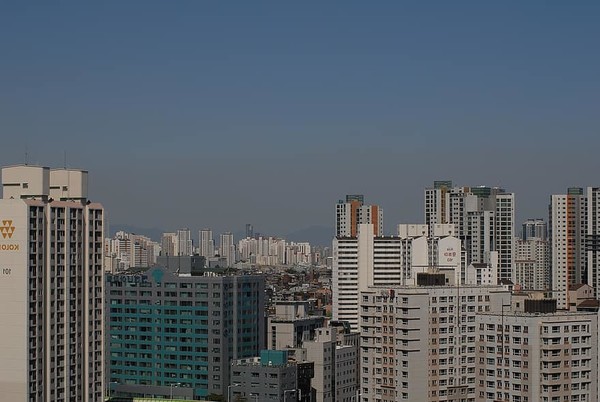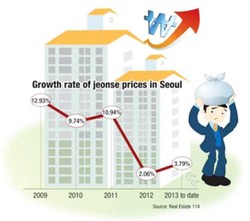
As the Moon Jae-in administration continually updated real estate policies, the news headlines of the first half in 2020 were filled with real estate issues. While there have been numerous reactions about the government’s real estate policies, revised housing lease laws proposed by the ruling party are the central issues these days. The legislation is a package of three laws: the right to renew the contract, regulation on rent hikes, and reporting on transaction of housing lease. The two of three laws, the right to renew the contract and regulation on rent hikes, belong to the ‘Housing Lease Protection Act’, and reporting on transaction of housing lease belongs to ‘Act on Report on Real Estate Transactions, etc.’ The contents of each law are different, but each aims to protect the lives of renters. But there are also voices of concern that the laws will bring a result opposite to their proposed purpose by destabilizing the rental market. Now, let’s take a look at the legislation, which started a bumpy ride, in detail.
What is the New Housing Lease Legislation?

The legislation package consists of the three laws mentioned above. The first bill is to grant tenants the right to renew their contract until one month before the contract expires. The current term of lease is two years. According to the existing Housing Lease Protection Act, the landlords can notify the tenants of a refusal of the renewal from two to six months before the term of the lease expires. In other words, the landlords take the initiative in the renewal even if the tenants wish to stay on. If the right to renew the contract is given, however, the tenants can require a two-year extension of their contracts and the landlords cannot refuse the requirement outside of some special circumstances. Accordingly, tenants are guaranteed total four-year residence; though there are again some special conditions for the landlords to refuse the extension. The conditions are specified in the bills: if the landlords or their immediate family move into the property, if the tenants delayed the rents over two months, and if the contracting parties mutually agreed to renew, etc. If none of these conditions are met, landlords cannot refuse their tenants’ requirements. When landlords break the contract and bring new tenants in by lyingly claiming that they will move into the house, the original tenants can claim for damages.
If the right to renew the contract is a law about ‘term of lease’, regulation on rent hikes is a law about ‘rents of lease’ which follows when the right to renew is exercised. It is a system that sets a cap on rent hikes to 5 percent of existing rent. Also, local governments can adjust the cap to less than five percent. For example, in Seoul where lump-sum jeonse deposit and monthly rent are higher than other regions, the Seoul city government can adjust the cap lower than five percent. The third bill is to mandate that landlords report actual rents of their contracts within a certain period of time. Up to now, while housing sales contracts were subject to immediate report, housing rent contracts do not have a duty to be reported. If the report system is introduced, however, contracting parties should report the transaction such as the deposit, rent, and terms of their lease to the si, gun, or gu office in their areas within 30 days after the contract is signed. If they are caught making false reports or not reporting, penalties will be imposed.
The crucial point to pay attention to is that the laws are retroactive. Retroactive application means that a law is applied even to actions that happened before the enactment of that law. As such, the new house lease legislation is applied even to the contracts that were signed before the enactment of the law. Accordingly, tenants of the present lease contract can also exercise the right to renew the contract as the law is implemented. Regulation on price hikes is also applied to the contracts. One of the biggest reasons why the lawmakers made the legislation as retroactive is to prevent the large jump of rental prices right before the enactment of the revised bills through the regulation on price hikes. Suppose that the regulation is not applied to existing contracts. In this case, there is a possibility that landlords hike up the rents by a large amount to cover future damage that the legislation will bring. According to the retroactive application, however, landlords cannot increase the rent by over five percent even to existing contracts.
The Background and Expected Effects

The reason why the members of the ruling party proposed the legislation is, above all, to stabilize the lives of ‘houseless’ people. According to Statistics Korea research, 8,7450,000 households, which is 43.8 percent of the 19,979,000 total households are houseless. This means that about half of all households are living as tenants now. Many of these houseless people are being ‘jeonse refugees’ due to high rents and short period of lease. Jeonse is a rental system unique to Korea, in which tenants pay a lump sum of money as a deposit that is close to the full price of the house or apartment, instead of a monthly rent. Originally, the Housing Lease Protection Act did not prescribe a cap on rents hike in when renewing the contract. Accordingly, because landlords can arbitrarily increase the rents when they renew the contract, tenants who cannot afford the increased rent had no choice but to leave the house. But, as there is now a cap of five percent in rent hikes when renewing, landlords can no longer increase the rent higher. Therefore, the regulation system can protect tenants from excessive price rises.
The basic term of lease is now two-years and it had not been extended since 1989 when the term was extended from one year. Tenants who cannot afford the high rents, and therefore have to move whenever the contract expires, face other difficulties due to the short period of lease. As their residence is unstable, they have difficulty in making plans for the future. Especially in case of the newly-married couples, the short period of two years becomes an obstacle to factors such as childbirth, children’s education, or workplace that should be considered in the long term. The expense of moving every two years is also a big burden of them. If they can exercise the right to renew the contract at this time, they are able to have more guaranteed housing stability. It is because they can extend the contracts for two-years and therefore can live at least four years in one place. Meanwhile, reporting on the transaction of the lease can improve the opacity of the rental market. Houseless people searching for the rental homes had difficulty in finding information because housing rent contracts did not have a duty to report the actual transaction. According to the National Tax Service research, houses that reported their transaction information to the market accounted for only 2,050,000, or about 28% of the total 7,310,000 rental households in May this year. Tenants who have less information than landlords naturally are at disadvantage. The reporting system improves the relations between them by resolving the information asymmetry. As transparency increases, safe transactions also become possible.
There Are Other Problems
The Damages to Tenants
Despite these expected effects, there are voices of concern that the legislation will fail to protect tenants contrary to their intended purpose. First, the rents can soar whenever the lease expires in a four-year cycle. As mentioned above, the legislation was made to protect tenants from the excessive rise of rent. However, think about the laws from the landlords’ point of view. In case of a tenant who lived for four-years using the right to renew contracts, it is better for the landlord to contract with new tenants rather than continually contracting with the same tenant. This is because the revised bills are about renewal, not new contracts. In other words, they can require new tenants to pay higher rents to recover their damage from the previous four-years. Therefore, tenants who contract at that time have to bear the bigger burden. Taken as a whole, it can be said that the revised bills cannot solve the rent raising problems. Actually, when the term of the lease was extended from one year to two years in 1989, rent rates jumped every two years. According to the KB Kookmin Bank, the rate of increase in Jeonse from 1991 to 1996 was 3.91%, 7.76%, 0.44%, 4.99%, 3.41%, 6.6%, showing an increase every two years.
Also, jeonse prices can soar due to the supply decrease as landlords hesitate to put out their properties to lease. Tenants, therefore, may have a hard time in finding rental properties, and the price also increases as the supply declines. Ham Young-jin, the head of the big data lab at real estate application ‘Zigbang’, pointed out that “As the landlords who tried to put out to lease recognize the necessity to leave the house empty, the amount of houses for rent can decrease due to the new legislation.” In response, the government announced its plan to supply rental houses in the Seoul metropolitan area starting August 4th, but it did not seem to calm public opinion. As such, a contradictory situation can occur where people searching for rental properties are hampered by the laws that aim to protect them. That is why many tenants, not only landlords, are also expressing concern about these laws.
The Damages to Leaseholders
The three laws, of course, are more opposed by landlords, as the laws are overall designed to protect tenants. They claim that the laws can violate their private ownership of property. It is because they have to renew the contracts if their tenants require. In landlords’ shoes, the right prohibits them from using their property as they will. There is also a problem that they cannot respond to business fluctuations elastically if the rate of increase is fixed at five percent. If high inflation occurs, a five percent rent increase can be lower than the inflation rate. Then, while tenants gain benefits, the landlords are harmed. As such, regulations in the three laws can be a big burden to landlords. This, in turn, causes the rise in rental house prices as mentioned above.
Reactions are divided over the new housing lease legislation. The three laws can protect many tenants by stabilizing leases, lightening the burden of rent hikes, and ensuring transparent contracts. But they are also facing criticism now. Some people are pointing out that the three laws will rather make things more difficult for tenants by reducing the properties available for rent. Actually, it is an undeniable fact that tenants are the weaker party in these relationships. And it is right for a welfare state to be on the side of the weak. But as there is a possibility that side effects will occur, the government should look at the future results carefully and meticulously. CAH hopes that the new housing lease legislation can make positive results in the long term.

